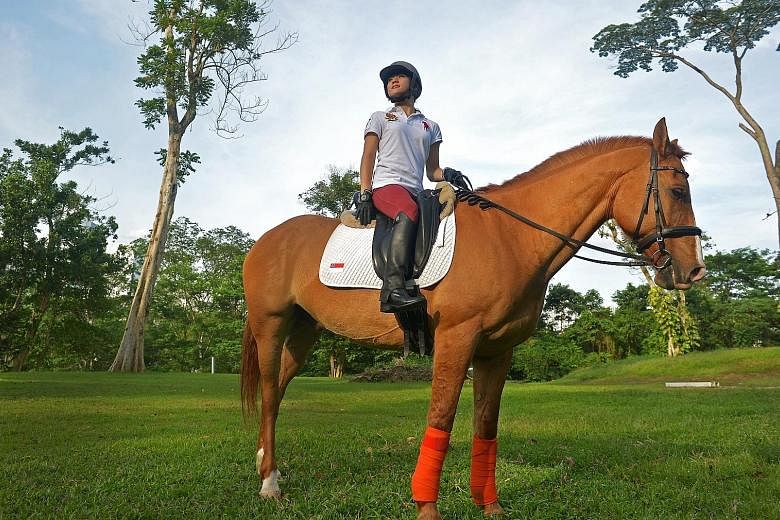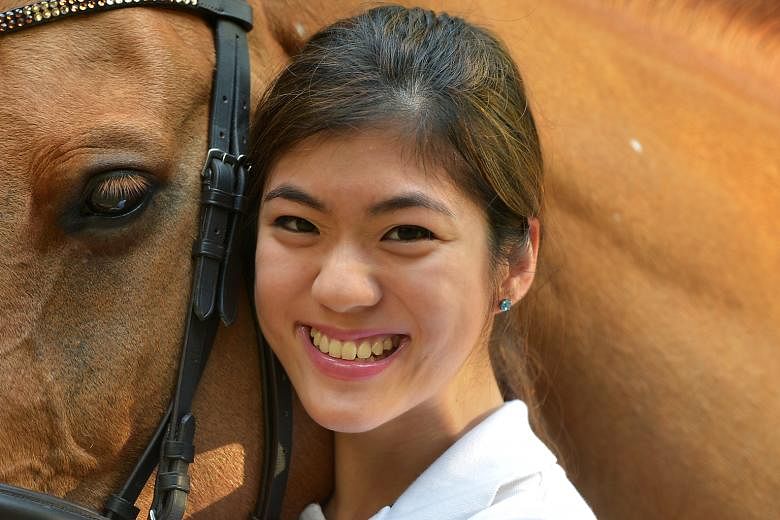Singapore is sending 13 athletes to the Sept 7-18 Rio Paralympics. The Straits Times takes a look at several of these representatives - how they manage to rise above their disabilities and how they train to compete with fellow Paralympians, as well as their hopes and aspirations
It is 4pm at the National Equestrian Centre. A petite 20-year-old tucks her ponytail under her helmet, puts aside her crutches and gets on a plastic step-stool. She is 1.48m tall, has cerebral palsy and is about to go for a ride.
Four people are in attendance to help her onto the horse and a minor panic breaks out. There is a crack in one of the steps on the step-stool she stands on. This is also not her regular horse and maybe it will get into a panic of its own.
But Gemma Rose Foo does not break a sweat. She fixes her eyes on the saddle, steps up and is quickly and smoothly astride the horse. All in a day's work for the Paralympian.
"Horses keep me calm and give me a sense of freedom," explained Foo, who started riding when she was eight to help deal with her cerebral palsy.
-
FACTS ON THE SPORT
-
Dressage is the only discipline contested, with 10 individual events and one team competition.
The individual competition features two categories: individual championship test and individual freestyle test.
The rider must prompt the horse to perform compulsory movements and freestyle routines choreographed to music.
Equestrianism is used as a rehabilitative tool - known as hippotherapy - for a wide variety of impairments as it is known to help with balance and coordination.
Team Singapore at Rio Games: Laurentia Tan, Gemma Rose Foo, Maximillian Tan
Category: Ia (Sept 11-16) There are five classifications in each test, Ia, Ib, II, III, and IV, with Ia being the classification for the athletes with the most severe impairment.
"(Riding) makes me feel alive. I can't run and the horse gives me the opportunity to ride while it trots and it feels like I'm running. It's truly an amazing feeling."
Riding did not just give her pleasure, it unlocked a talent. She has been riding for 12 years now and more recently, has been training out of Cologne, Germany every day.
She is due to make her second Paralympic equestrian appearance at the Sept 7-18 Rio Games, in the Ia classification (for athletes with the most severe impairments).
When Foo was younger, her muscles would be so stiff that she had to use the utmost force to get her limbs to bend.
Now, she is able to bend her arms and have some control over them. However, she believes that the sport has transcended its benefits as a form of hippotherapy - the use of horse riding as a rehabilitative treatment. More importantly, riding has helped her psychologically.
Her mother, Jacqueline Foo, 51, recalls what her daughter was like as a child. She said: "She wasn't a difficult kid; she was smiley, but I guess she was probably in some sort of pain all the time because of her limitations and the frustration.
"But horse riding helped her. She was happier and she really looked forward to her lessons every week because she'd found her purpose," said the yoga instructor.
However, the ride has not always been smooth for the avid Game of Thrones fan.
"It took me a while to accept that I couldn't do things as well as other people and accept who I was," she admitted. "My legs would get stiff and I couldn't get them to bend. I would suffer from spasms and my muscles would be really tense, making it really difficult for me to bend my knee and get from one point to another.
"I felt frustrated and restricted and unable to do things I wanted to. I always tell my sister, 'You're so lucky you can run.'"
Since her parents wanted her to be treated like "any other kid" and not receive any "special treatment", they sent her to mainstream schools.
Then came a different set of challenges as the Paralympian recalls being bullied in primary school.
"I found a notebook once with terrible stuff about me written in it and a drawing of a broken leg. (The bullies) even told me I wasn't going to live long. They'd hide my stuff high up on shelves so I couldn't reach it.
"It took a while for me to forgive them, but I get that it was just peer pressure and they were young. I was really down at that point, but I just focused on what I do best (horse riding) and managed to overcome it. "
Foo is no stranger to using her passion for riding to overcome adversity. She suffered a setback in March when she was thrown from her horse in Cologne. The fall left her with a ruptured spleen and three months without riding.
Yet, she refused to give up riding or her Paralympic quest. She will enter the Games still in recovery.
"One of the doctors suggested stopping the sport, but I was like, 'No, I've come so far and I want to ride again'... I was completely terrified of riding again because all I could think about was the accident and I was affected by all the sounds around me.
"(But) it's a learning journey and these obstacles help you become a stronger person. When you fall, you just get back up."
It was her coach who helped her conquer her fear. "My coach had this really great plan to make sure I was really safe on the horse and got me to ride horses that were deemed safe and really steady. He rented a horse that pulls carriages. That horse and my coach's other ones really helped me get my confidence and feel of riding back."
Foo believes that beyond helping her look past her disability and giving her a career in equestrian sport, horse riding has changed her life forever.
"Life is unfair sometimes, who said it was easy? Riding (gives me a sense) that even though I have a disability, I was made to do great things. I'm so glad I've found my purpose in life."
Her mother agreed. "It's given her confidence."
But Gemma is not the only one who has gained through this process. Jacqueline has benefited too.
She explained: "It's amazing because for me, I thought I'd be taking care of her for the rest of my life.
"(While) I hope I don't go too soon because I'm afraid that she'll need me, the fact that (horse riding) has given her more confidence and independence really makes me more relieved to know that maybe if that happens, it won't be so bad."



